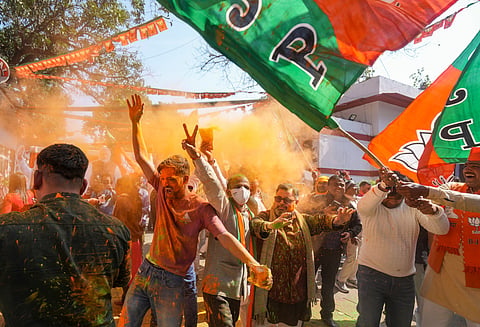

BJP has won massively in Delhi. Its tally of 48 seats betters its 1993 performance when it won 47 seats. Delhi since then has changed enormously, therefore the factors contributing to BJP’s victory would be much different than what led it to come to power in 1993.
For someone who has followed Delhi politics since 1993, there were few takeaways on factors contributing to BJP’s massive mandate in 2025. First, as I had mentioned in my column last week, BJP needed the Baniyas and Punjabis to vote for them. There are 35 seats dominated by the combined votes of these two communities, it won on 29.
Now this marked a massive difference from the 2015 and 2020 polls, when the saffron party, which saw these two communities as its natural voters, could win just two out of these 35 seats. Once the support of Punjabi and the Baniya voters, who voted for the BJP in the consecutive Lok Sabha elections but not in Vidhan Sabha, was ensured, moving towards not just the halfway mark of 35 but crossing it with wide margin was going to be easy.
What other factors could have contributed? First and foremost the support of the Purvanchal voters. Their support was also acknowledged by Prime Minister Narendra Modi in his thanksgiving speech. Union Home Minister Amit Shah’s announcement during the run-up to the polls that he was going to grant property rights in the 1,700 unauthorised colonies massively got the support of the Purvanchali residents living in these colonies.
While mobilising support in the unauthorised colonies, BJP also made inroads into the constituencies reserved for the Schedule Castes and dominated by the minorities especially in the trans-Yamuna areas of East and North East Delhi. This also led to the chipping at the base of Aam Aadmi Party vote bank. It’s not easy to dismantle a ruling party which has survived so long on voter’s greed by distributing freebies.
Prime Minister Narendra Modi intervening and promising to retain all the freebies which were being given by the Aam Aadmi Party, helped neutralise the attraction on this count for the Aam Aadmi Party. The saffron party went a step further by adding value to some of these freebies including the pension for women, a major support base for Aam Aadmi Party.
Though the Aam Aadmi Party won a majority of the minority seats but there were signs of fracture in the Muslim support for Arvind Kejriwal’s party. Some of the Muslim community leaders who won on the AAP tickets are those who have travelled from the Congress to the Aam Aadmi Party.
With the top leadership of the Aam Aadmi Party having been completely demolished except for exception of incumbent Chief Minister Atishi and Gopal Rai, another Minister, it would be challenge to not only retain these winning candidates within their fold but also the minority support. In due course of time it may well travel back to where it came from.
Taking from there, the biggest challenge before Arvind Kejriwal would now be keep his flock together. The Aam Aadmi Party has the problem of lack of ideological glue to keep these people together. Most the people who have come to join AAP over a period of time have been political fortune seekers and if these political gold diggers don’t see a future here, they would look elsewhere.
Given the situation, Arvind Kejriwal has two immediate tasks, one of them being to save his authority in the Municipal Corporation of Delhi, where Aam Aadmi Party holds a slender lead over BJP. The other is to keep the AAP government in Punjab stable.
With anti-defection law not affecting migration of councillors from one bench to another, BJP could well come to take control of the municipal body. Given the well-pronounced BJP policy of double engine governments, that is the same party government at the Centre and in the states, they well aspire to add another engine in Delhi that is the Municipal Corporation. They could justify it saying it would provide a greater strength and momentum to clear the civic morass, which the national Capital currently finds itself in.
Sidharth Mishra
(Author and president, Centre for Reforms, Development & Justice)